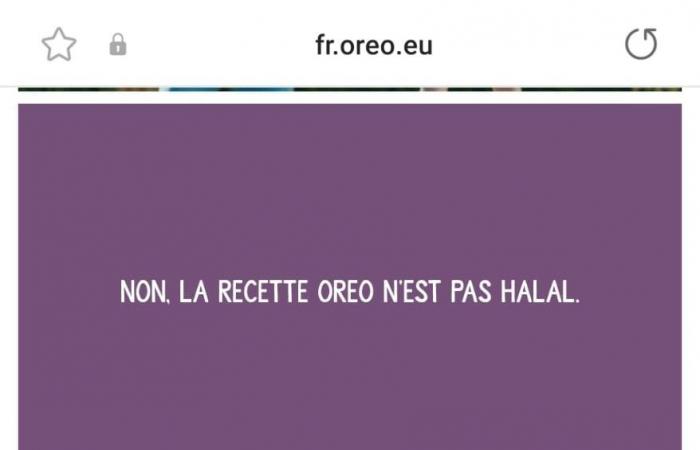The first biscuit in the world “OREO”, with its two varieties (manufactured by Mondelez Morocco in Ain Sebaa, manufactured in Spain and imported by the same company), invades Moroccan markets, including supermarkets.
After the company producing “OREO,” in May 2019, quickly deleted a tweet on Twitter, which stated, “Oreo is not halal. Thank you for your message. This caused her an unprecedented crisis, after which she published an explanatory communication reassuring Muslims, pointing out that the products which are distributed in the Middle East and in all Arab countries are “halal”, while those distributed in the States United States and Canada contain alcohol. ; He explained that the product, which is distributed – at least – in the Arab region, is manufactured at the company’s factories in Dammam, eastern Saudi Arabia, at Nabisco Arabia Co. Ltd., ( after this crisis) today, the company reaffirms on its official website, as the Bayan newspaper saw today, that the product “Oreo” is not halal.
After the flurry of inquiries and questions that surfaced on social media late last week about whether Oreo marketed in Moroccan is halal or not, after what the company announced on its official website, I’m went to “Bayan Al-Youm”, a number of small stores and large storefronts, to display the information. Labeled on the cover of the product which is marketed on the Moroccan market, in particular the place of manufacture, and it results from it inside one of the large facades, that the biscuit shelves contain two types of biscuits concerned.
The large facades and all the stores, as inspected, display a variety of Oreo cookies which are manufactured by Mondelez Morocco, in the Ain Sebaa region of the economic capital, Casablanca. 2,12,389, while large facades and very few stores display second class, which is made in Spain.
As for the second type made in Spain – a factory that is not affected by the company’s notification in 2019 where the non-halal product is made – which in turn does not carry the “UNSA” mark, it is labeled by the manufacturer in six different languages, excluding Arabic, which means that it does not cater to the Arab region. In general or Muslims in particular, noting that an outer label containing the Arabic address has been affixed to the product packaging by the importing company in Morocco.
Factory in Spain – Factory in Morocco
It should be noted that the second variety imported from Spain differs in composition and form from the product produced in Morocco, and it should also be noted that for many years it was marketed only in certain stores in the cities of the north – it was smuggled in – before it began to be marketed recently little by little among neighborhood stores, And now in large facades, which raises the question of whether this product, which began to be marketed in the rest of the cities and large facades, enters a legitimate way or not.
**********
Al-Kharati: There is smuggling or indifference, and one wonders about a role ” ONSSA”
In this context, Bouazza Al-Kharati, president of the National University for Consumer Protection, said that this controversy is about the product known as “Bisquid Oreo”, and because the Consumer Protection Association from the East quarter asked the company a question and the answer was that this product is not halal, so we as a Moroccan university protect the rights The consumer wonders what is the role of ONSSA in this catastrophe, and also what is the role of the Ministry of Awqaf in this catastrophe.
Al-Kharati added in a statement to Bayan Al-Youm newspaper that as consumers, they are waiting for the response from the Ministry of Awqaf and Islamic Affairs to provide them with information, whether this product can be consumed or not, and clarify if it is imported for non-Muslims, adding: “Especially there are two types on the market, the first is Moroccan production. “In Ain El Sabaa Casablanca, its color is different from that imported from Spain, and we also find them on the market together, but without the control and license mark “ONSA”, and it is not allowed, everything as “ONSSA” prohibits the importation of any foodstuff comprising a product or substance prohibited by Islamic law, in particular in the Maliki Sunni school.
Al-Kharati pointed out that each food production store must have a sanitary license or sanitary accreditation, and any bulk storage store also requires a sanitary license, adding, “But we find that this product does not have a license” UNSA”, and therefore we can consider it as income. Indirectly by smuggling, or there is indifference, and we know that the control is done in three stages, the first stage is done by the follow-up of the files accompanying the product, and the second control is the control by levy, c that is to say that we make sure that what is written in the documents if it corresponds to what is written on the cover, and the third stage is when we suspect, we resort to the laboratory .
Al-Kharati asked: “In this case, is it necessary to resort to the laboratory, or do the products that are imported into Morocco must be accompanied by a halal certificate or marked with a halal mark”, explaining: ” Many countries are adopting this material. Indonesia, for example, does not enter any substance unless it has been classified as halal, so we hope that Morocco will legislate a law allowing the entry of only halal products, and that it will be put implemented at the customs level, and the stores will be informed so that they only import halal products.
Abdel Samad Edeniden
Tags: Nonhalal OREO cookies invading supermarkets supermarkets Morocco


